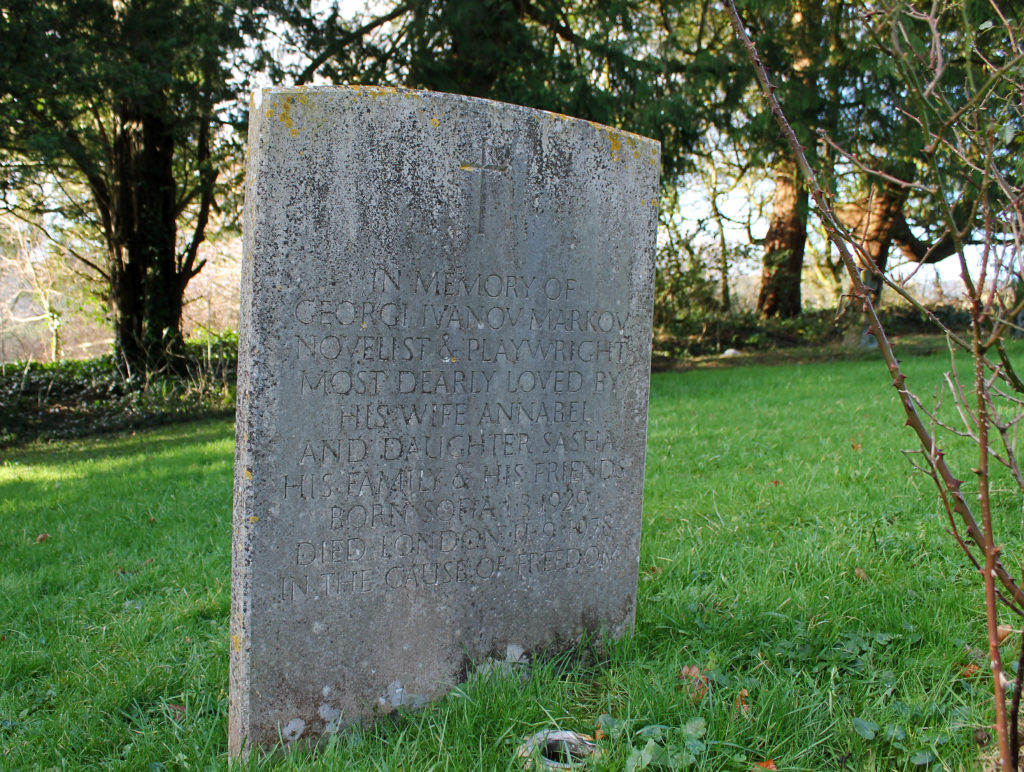
Georgi Markov headstone, Whitchurch Canonicorum churchyard VI
© Stoutcob is licensed with CC BY 2.0. To view a copy of this license, visit https://creativecommons.org/licenses/by/2.0/
Biography
Georgi Markov, was born in Sofia, Bulgaria in March 1929. His first book, The Night of Celsius, was published in 1957 and was followed by The Ajax Winners in 1959. In 1962, he wrote the novel Men which won an award from the Bulgarian Writers Union.
In 1962 Markov left Bulgaria for Italy before eventually settling in London where he worked for the BBC World Service. He went on to work for Radio Free Europe and frequently criticized the Bulgarian regime during his broadcasts. In 1972 a Bulgarian court sentenced him in absentia to six years in imprisonment for his defection to the West.
In 1978 Markov was poisoned by a suspected member of the Bulgarian intelligence service on his way to work in London. A ricin pellet was fired from an umbrella into his leg as he waited at a bus stop on Waterloo Bridge. At first Markov thought nothing of the incident, thinking it a minor accident. He died three days later. Markov had apparently been tipped off that he could be killed by poison and had taken to only eating at home with friends and family. Since then, British investigators have been attempting to resolve the murder but have been thwarted by the Bulgarian authorities blocking access to information, and the fact that some documents appear to have been destroyed. In 1993, an Italian based in Denmark, Francesco Guillino, was questioned by British and Danish police, when he reportedly admitted to being an agent for the Bulgarian secret services, but denied suggestions that he had murdered Markov. Information disclosed by a Bulgarian researcher in 2005 suggests that Guillino had been involved. He has, however, not been seen since. Shortly after Markov’s murder, another Bulgarian exile, Vladimir Kostov, a radio editor, was also stabbed by a poisoned umbrella as he was walking in Paris, but was saved by thick clothing that stopped the pellet from penetrating his skin. It is reported that after the fall of the communist regime in Bulgaria, a stash of umbrellas adapted to shoot pellets was found in the interior ministry.
In 2000 Georgi Markov was posthumously awarded Bulgaria’s highest honor; The Order of Stara Planina.
Writing Sample
Of all the attributes that one could admire in the character of one’s countrymen, I am proudest of the Bulgarians’ incredible sense of humour. How often have I marvelled at the natural way this feeling bubbles up, and remarked how closely it is linked to public judgements, the expression of political views and profound popular wisdom. I think that this sense of humour has something in common with the striking absence of blind fanaticism in the Bulgarian people. In our country, only the stupid are fanatics. However passionately and convincingly you may defend some true and attractive cause, you will notice in your interlocutors a slight smile, as if to say: ‘Is it really all that important?’
…
In everyday life the double entendres and the mocking insinuations never ceased. Words, newspaper headings, film and book titles were distorted, official pronouncements were parodied, important Party officials were imitated. I knew an ordinary worker with a remarkable gift for imitating Vulko Chervenkov, Todor Zhikov and others. His imitations were amazingly accurate and we made him deliver whole speeches. Local folk epigrammatists spawned like mushrooms and had fun rhyming the name of our leaders.
There was something very healthy as well as profound in this folk humour. I think people used it as a means of self-preservation. The Communist Party and its members, the mass of whom seemed to have no sense of humour whatsoever, reacted sharply and intolerantly against this popular laughter. They knew, and know, that it was aimed at them, but they were too narrow-minded to be able to show generosity. Not a few folk humourists were arrested, beaten up, imprisoned for having told jokes. In the files of many Bulgarian citizens it is solemnly stated that they told or repeated anecdotes.
From The Truth That Killed, trans. Liliana Brisby (London: Weidenfeld and Nicolson, 1983) ISBN: 0-297-78300-9
Useful Links
On the ongoing investigation into the murder and refutation of claims that Markov was a spy (2019): https://www.rferl.org/a/no-agent-bulgarian-spies-letter-refutes-talk-of-umbrella-murder-victim-markov-as-spy/29772449.html
Wikipedia item on Georgi Markov: http://en.wikipedia.org/wiki/Georgi_Markov